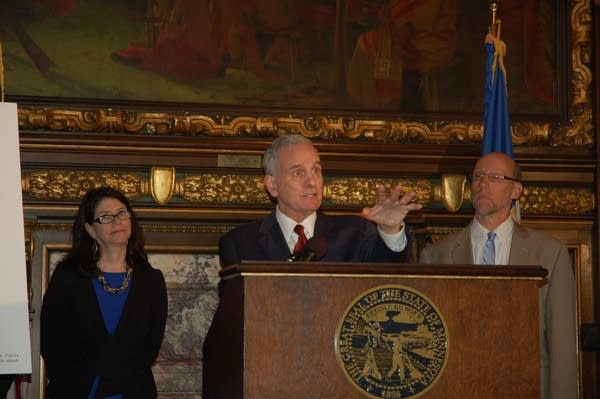Dayton: Property taxes projected to go down in 2014


Gov. Mark Dayton is praising a new state report that projects property taxes will drop statewide in 2014.
According to the state Revenue Department, local governments are expected to reduce property taxes because they will receive more money from the state.
But with no guarantee that will happen, Minnesotans can expect yet another tax policy debate between Dayton and Republican legislative leaders.
Create a More Connected Minnesota
MPR News is your trusted resource for the news you need. With your support, MPR News brings accessible, courageous journalism and authentic conversation to everyone - free of paywalls and barriers. Your gift makes a difference.
Republicans have spent the last few months criticizing the budget enacted by the governor and DFL-controlled Legislature because it increases spending by $2.1 billion. The new money came from higher income taxes on top earners and higher tobacco taxes.
DFLers have argued that the tax increase was needed to balance the budget and increase funding for schools, job creation efforts and state aid to cities and counties.
State Rep. Jim Davnie, DFL-Minneapolis, said the increase in aid to local governments and direct property tax refunds to homeowners mean lower property taxes for the first time since 2002.
"What we know is when Minnesotans open their property tax statements, when Minnesotans get their property tax refund checks, their property taxes will be down, their refund checks will be larger and the government services that they rely on will be more robust and enhanced," Davnie said.
State Revenue Commissioner Myron Frans acknowledged that local government officials will make the final decisions on property taxes when they set their budgets over the next five months.
Frans said the department's report is based on what counties and cities did with past state aid payments.
"We'll see how they do it. It's up to the local officials," he said. "It's their job to set local levies and the amounts, but we've taken a look at the data and this is what we'll project will happen. We'll know for certain in February how it all turned out."
Although the news conference by Dayton and DFL leaders was aimed to trumpet the report, it also provided Democrats with some political ammunition to counter Republican charges that they are simply raising taxes. Dayton also may be sending a signal to local government officials to watch their spending.
"I would expect we'll see local government officials will be delighted to take the additional resources that the state provides and use that to reduce the property tax burden because they hear about it just as much as we do here," the governor said.

But city and county officials hinted property taxes could still go up. Gary Carlson, a lobbyist for the League of Minnesota Cities, said homeowners shouldn't necessarily expect to see a reduction in overall property taxes when they get their statements later this year.
"Many cities right now are still looking to recover from some of the cutbacks that they made not only in staffing cutbacks but in simply repaving streets and resealcoating roads," Carlson said. "It's hard to say at this point where property taxes will end up next year."
Republicans are betting that cities and counties increase their levies.
Senate Minority Leader David Hann said he doesn't believe property taxes will go down. He said there isn't any direct link between increased aid to cities and counties and lower property taxes.
"They've gone up every year," said Hann, R-Eden Prairie. "I don't think there's any evidence to show that increasing local government aid has the effect that they're claiming that that somehow translates in the reduction of local taxes. It just doesn't work that way."
Democrats received another piece of positive news about their budget when Moody's Investors Service changed Minnesota's financial outlook from "negative" to "stable."
The national credit ratings agency had lowered its outlook for Minnesota in August of 2011, following the state government shutdown. Moody's announced that it raised the outlook to reflect the state's strong financial management that has resulted in improved revenue performance.